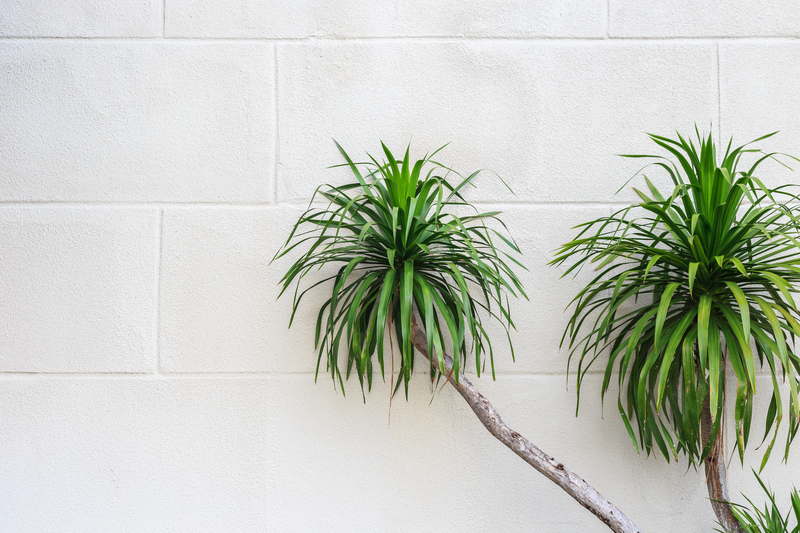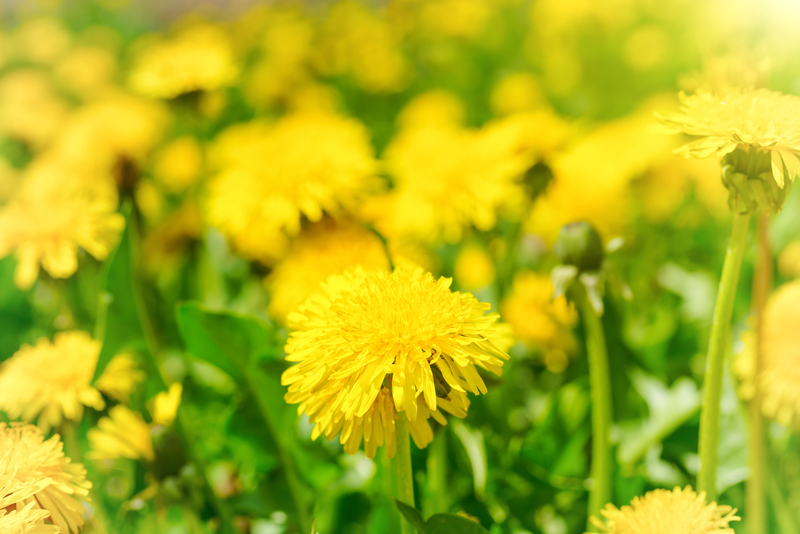Beginner's Guide to Gardening: 9 Vital Tips
Posted on 13/06/2025
Beginner's Guide to Gardening: 9 Vital Tips
Welcome to your beginner's guide to gardening! Starting your first garden can feel overwhelming, but with the right guidance and a few secrets from the experts, you'll be harvesting home-grown veggies and enjoying vibrant flowers in no time. Whether your goal is a lush backyard Eden or a bountiful vegetable patch, these nine vital gardening tips for beginners are here to transform you from novice to nurturing plant parent.
In this comprehensive article, you'll discover practical advice, simple gardening techniques, and step-by-step tips--all tailored specifically for those new to gardening. Let's dig in!
Table of Contents
- 1. Understand Your Gardening Space
- 2. Choose the Right Plants
- 3. Prepare Your Soil
- 4. Start with Good Seeds or Seedlings
- 5. Watering Wisely
- 6. Master the Art of Mulching
- 7. Feed Your Plants Properly
- 8. Keep Pests and Diseases in Check
- 9. Cultivate Patience & Learn as You Grow
1. Understand Your Gardening Space
Every great garden starts with knowing your space. Before you plant a single seed, spend time observing your yard, balcony, or windowsill. Consider these questions:
- How much sunlight does each area receive? Most vegetables and flowering plants need full sun (at least 6-8 hours daily), while some shade-loving varieties will thrive with less.
- What is your climate zone? Understanding your USDA plant hardiness zone or your local climate helps you select appropriate plants.
- What is your soil type? Sandy, clay, silt, or loam soil each has unique characteristics. Testing your soil is the first step to helping your future garden flourish.
Pro Tip: Sketch a simple map of your gardening area and note sunny spots, shaded corners, and wind patterns. This preparation will make plant selection easier and more successful!
2. Choose the Right Plants for Your Beginner Garden
Not all plants are created equal--especially for first-time gardeners. One of the most important tips for beginner gardeners is to select easy-to-grow plant varieties suited to your climate and gardening goals.
- If you want a herb garden, start with basil, mint, parsley, or chives.
- For a vegetable patch, try lettuce, radishes, or beans--they grow fast and are forgiving.
- For flowers, marigolds, sunflowers, and zinnias are colorful, robust choices.
Begin by purchasing young plants (seedlings) from a garden center, or try sowing seeds directly into the soil for extra satisfaction.
Why Plant Selection Matters
Starting with the right plants reduces frustration and greatly increases your chance of gardening success. Be sure to check each species' sunlight, water, and space requirements before planting.
3. Prepare and Improve Your Soil
Soil is the foundation of every healthy garden. Even a beginner's garden needs rich, well-draining soil to help plants thrive. Here's how to get started:
- Test Your Soil: Use a simple soil test kit to check pH and nutrient levels. Most vegetables prefer slightly acidic to neutral soil (pH 6-7).
- Add Organic Matter: Mix in compost, aged manure, or leaf mold. This improves soil structure, drainage, and fertility.
- Loosen the Soil: Using a garden fork or hand trowel, gently break up any compacted soil to allow roots to penetrate easily.
Quick Soil Fixes for Beginners
- Heavy clay soil? Mix in sand and compost to loosen it.
- Sandy soil? Add organic matter to help it retain water and nutrients.
Remember that improving your soil is a process, not a one-time job. Each season, keep adding compost and other organic amendments.
4. Start with Good Seeds or Healthy Seedlings
High-quality seeds or healthy seedlings are essential for a productive first garden. Always source your seedlings or seeds from reputable nurseries or local garden centers.
- Check seed packets for information on planting times, spacing, and depth.
- Seedlings should have strong stems and vibrant leaves, free of yellowing or spots.
For the ultimate beginner-friendly experience, many gardeners suggest starting with seedlings. They get your garden off to a quick, successful start!
5. Watering Wisely: How Much and When?
One of the most common beginner mistakes is improper watering. Plants need the right amount of water to grow and produce flowers or food, but too much or too little can cause serious problems.
Golden Rules for Watering Your Garden
- Water early in the morning to reduce evaporation and prevent fungal diseases.
- Water deeply and infrequently: This encourages deep root growth and resilient plants.
- Check soil moisture by sticking your finger an inch into the soil. If it feels dry, it's time to water.
- Avoid watering leaves: Focus on the base of the plant to keep leaves dry and avoid problems like mildew.
Modern gadgets like soil moisture meters can help take the guesswork out of watering!
6. Master the Art of Mulching
Mulch is a beginner gardener's best friend! It helps prevent weeds, retains soil moisture, and keeps roots cool in summer heat.
- Use organic mulches (straw, shredded bark, compost, leaves) around vegetables and flowers.
- Spread mulch 2-4 inches deep, but keep it a couple of inches away from plant stems to prevent rot.
Mulching not only saves time but also protects your garden in almost every season.
7. Feed Your Plants Properly
Nutrition is key for strong, productive plants. If you're wondering how to feed your garden, here's a simple beginner's guide:
- Start with compost: It provides a slow release of nutrients and supports soil health.
- Use balanced organic fertilizers according to package instructions--over-fertilizing can harm your plants!
- Monitor plant health: Yellowing leaves, stunted growth, or pale coloring may indicate nutrient problems.
Remember, more fertilizer isn't always better. Healthy soil, proper watering, and compost are often all your beginner garden needs.
8. Keep Pests and Diseases in Check
No garden is immune to pests or disease, but you don't have to reach for harsh chemicals right away. Integrated pest management (IPM) is a beginner-friendly strategy that combines good habits and natural solutions:
- Inspect plants regularly for holes in leaves, discoloration, or sticky residue.
- Encourage beneficial insects (like ladybugs and lacewings) which eat harmful pests.
- Remove diseased leaves or insects by hand whenever possible.
- Use natural controls (such as neem oil or insecticidal soap) as needed, following label directions.
Prevention is Key!
Healthy, well-watered, and well-fed plants are less likely to suffer from severe pest or disease issues.
9. Cultivate Patience & Learn as You Grow
Every skilled gardener was once a beginner! The secret to gardening success is patience: plants take time to grow, and the natural world is full of surprises.
- Observe your garden daily. Small changes (like new shoots or insects) teach you about your plants' needs.
- Keep notes or take photos: Document what works and what doesn't for future seasons.
- Ask for advice at your local garden center or join a community gardening group to learn from others.
- Celebrate small wins! Whether it's your first tomato or a single bloom, enjoy every step of the journey.
Remember, even mistakes are part of becoming a great gardener.


Frequently Asked Questions About Starting a Garden
How do I start a garden with limited space?
*Container gardening* is perfect for patios, balconies, or even sunny windowsills. Many vegetables and herbs thrive in pots! Choose compact varieties and ensure pots have good drainage.
What are the easiest plants for beginners?
Some of the easiest plants to grow for new gardeners include lettuce, radishes, beans, sunflowers, marigolds, basil, and chives. These require minimal care and reward you with quick growth.
How often should I water my garden?
Frequency depends on your climate and soil type. As a guide, water deeply 1-2 times per week instead of shallow, daily sprinkles. Check soil moisture to guide your watering schedule.
Final Thoughts: Your Gardening Adventure Begins Now!
With these nine vital tips for new gardeners, you're ready to cultivate a thriving, beautiful space--no experience required. Remember, gardening is a lifelong learning process, rewarding you not just with flowers or food, but with relaxation, pride, and a deeper connection to nature.
If you're eager for more gardening advice, bookmark this ultimate beginner's gardening guide and check back for regular tips on organic gardening, flower selection, and best backyard practices.
Happy gardening!
Latest Posts
Bolster Your Garden's Defense Against Severe Weather Threats
Privacy Solutions: The Best Fast-Growing Hedge Options
Discover Peace with These Elegant Zen Garden Innovations
The Garden Revolution: Combating Climate Change at Home
Make Your Garden a Haven with Perfectly Designed Seating Areas

